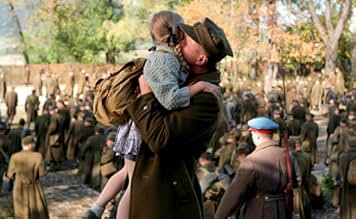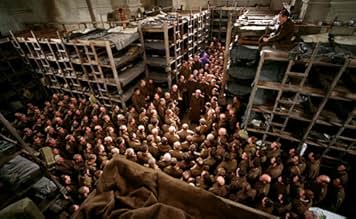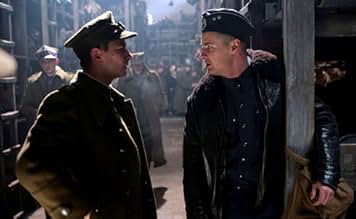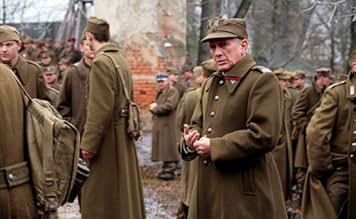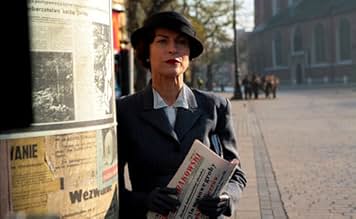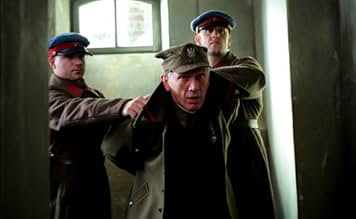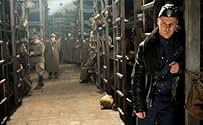An examination of the Soviet slaughter of thousands of Polish officers and citizens in the Katyn forest in 1940.An examination of the Soviet slaughter of thousands of Polish officers and citizens in the Katyn forest in 1940.An examination of the Soviet slaughter of thousands of Polish officers and citizens in the Katyn forest in 1940.
- Nominated for 1 Oscar
- 14 wins & 14 nominations total
Joachim Paul Assböck
- Obersturmbannführer Bruno Müller
- (as Joachim Assböck)
Featured reviews
A well done picture speaking for those who cannot speak for themselves and would be gladly considered never existing by some.
Although it's difficult to credibly and adequately convey the horror of such a murder which became a life tragedy for many Polish families and undoubtedly affected the way Poland looked after the war I think the director made a good job. Especially so, that it happened to be his personal tragedy as well.
Despite that the movie is well-balanced with emotions and atmosphere. Modest colors and anxious music by Penderecki emphasize the horror of those who were waiting. Short cuts of brutal scenes of murder leave speechless. No additional comment is needed.
Although it's difficult to credibly and adequately convey the horror of such a murder which became a life tragedy for many Polish families and undoubtedly affected the way Poland looked after the war I think the director made a good job. Especially so, that it happened to be his personal tragedy as well.
Despite that the movie is well-balanced with emotions and atmosphere. Modest colors and anxious music by Penderecki emphasize the horror of those who were waiting. Short cuts of brutal scenes of murder leave speechless. No additional comment is needed.
I watched "Katyn" on a home computer screen. Even in that limited format, "Katyn" had an impact on me comparable to such cinematic greats as "Lawrence of Arabia." I cried throughout most of the film. I resolved that many of my relationships would be different. I remembered people I had known who reminded me of characters in the movie. After the film ended, I felt that I could not listen to the radio or read the newspaper or listen to anyone speak. I just needed to allow the film to sink into me.
Naysayers have critiqued "Katyn" as boring and dull. If you need a film to depict war, occupation, and atrocity as shiny, compact, and compelling as a sports car, then you should listen to those naysayers; don't watch "Katyn," rather, watch the very silly, teen fanboy-friendly Quentin Tarantino flic, "Inglorious Bastards." If you've seen enough Hollywood productions jam-packed with sexy Nazis and happy endings, and you want to take in a film that dares to depict, in eyeblinks, what war, atrocity, and occupation looked like and felt like to real people, then by all means see "Katyn." One of the many features that I admired: "Katyn"'s Nazis are not sexy. They are not Tom Cruise, Liam Neeson, Christoph Waltz. "Katyn"'s Nazis are brutal, repugnant thugs.
I respect this movie. There are too few movies about which I'd say that. It shows the courage not to attempt to weave an uplifting, feel-good atrocity narrative that leaves the viewer with a smile. This isn't "Schindler's List." "Schindler's List" is a very good movie, but this isn't that. It is, rather, very much like what World War Two and the subsequent Soviet occupation sounded like to me when I listened to my own older friends and relatives, who lived through both. This is disjointed narrative, stories that seem headed for redemption or even ecstasy but that end in random death, that end in aborted normalcy, aborted joy, aborted meaning. I felt, in watching these cold, pale, stoic characters, as if I were, once again, sitting across the table from older Eastern European friends and relatives. Yes, that's what they looked like. Yes, those are the facial expressions they assumed when they talked about the uncle who was rounded up and never heard from again, the daring, handsome lad who ended up in a mass grave – or when they pointedly did *not* talk about these people. The gravestone whose inscription dares to tell the truth; the tearing down of a propaganda poster; the Red Army soldier who struggles to do the right thing by a widow, who won't yet admit that she is a widow; the singing of exactly the right Christmas carol at exactly the right moment: those are exactly the heroic gestures that no one ever saw, that went unrecorded, that only one person lived to tell about, to tell me. Here they are, on screen.
When a movie is named "Katyn" the viewer knows how it will end; it's kind of like a movie named "Auschwitz" or "Kolyma" or "Wounded Knee." There isn't going to be a surprise ending. I was still surprised by the ending, by how courageous and moving I found it. Once again, Andrzej Wajda managed to wow the film-goer in me. And he managed to move the human in me.
See "Katyn." See a movie you can respect, a movie that is worth your time.
Naysayers have critiqued "Katyn" as boring and dull. If you need a film to depict war, occupation, and atrocity as shiny, compact, and compelling as a sports car, then you should listen to those naysayers; don't watch "Katyn," rather, watch the very silly, teen fanboy-friendly Quentin Tarantino flic, "Inglorious Bastards." If you've seen enough Hollywood productions jam-packed with sexy Nazis and happy endings, and you want to take in a film that dares to depict, in eyeblinks, what war, atrocity, and occupation looked like and felt like to real people, then by all means see "Katyn." One of the many features that I admired: "Katyn"'s Nazis are not sexy. They are not Tom Cruise, Liam Neeson, Christoph Waltz. "Katyn"'s Nazis are brutal, repugnant thugs.
I respect this movie. There are too few movies about which I'd say that. It shows the courage not to attempt to weave an uplifting, feel-good atrocity narrative that leaves the viewer with a smile. This isn't "Schindler's List." "Schindler's List" is a very good movie, but this isn't that. It is, rather, very much like what World War Two and the subsequent Soviet occupation sounded like to me when I listened to my own older friends and relatives, who lived through both. This is disjointed narrative, stories that seem headed for redemption or even ecstasy but that end in random death, that end in aborted normalcy, aborted joy, aborted meaning. I felt, in watching these cold, pale, stoic characters, as if I were, once again, sitting across the table from older Eastern European friends and relatives. Yes, that's what they looked like. Yes, those are the facial expressions they assumed when they talked about the uncle who was rounded up and never heard from again, the daring, handsome lad who ended up in a mass grave – or when they pointedly did *not* talk about these people. The gravestone whose inscription dares to tell the truth; the tearing down of a propaganda poster; the Red Army soldier who struggles to do the right thing by a widow, who won't yet admit that she is a widow; the singing of exactly the right Christmas carol at exactly the right moment: those are exactly the heroic gestures that no one ever saw, that went unrecorded, that only one person lived to tell about, to tell me. Here they are, on screen.
When a movie is named "Katyn" the viewer knows how it will end; it's kind of like a movie named "Auschwitz" or "Kolyma" or "Wounded Knee." There isn't going to be a surprise ending. I was still surprised by the ending, by how courageous and moving I found it. Once again, Andrzej Wajda managed to wow the film-goer in me. And he managed to move the human in me.
See "Katyn." See a movie you can respect, a movie that is worth your time.
An estimated minimum of 3 million Poles were killed by the Stalinist regime; but as Stalin observed "When one person dies it's a tragedy; when a million people die it's a statistic".
The scope of these activities would be considered genocide, if that term was used to describe political and social, as well as racial and religious populations.
So - less "statistically"- mothers, fathers, brothers, sisters, kids, and friends were murdered for the political ends of those who now wish to remain faceless and unknown. It is critical, if we are to emerge as a humane people, that the unknown and faceless multitudes of both victims and their oppressors and killers, be reveled. This movie perhaps, is the first step in that direction.
The scope of these activities would be considered genocide, if that term was used to describe political and social, as well as racial and religious populations.
So - less "statistically"- mothers, fathers, brothers, sisters, kids, and friends were murdered for the political ends of those who now wish to remain faceless and unknown. It is critical, if we are to emerge as a humane people, that the unknown and faceless multitudes of both victims and their oppressors and killers, be reveled. This movie perhaps, is the first step in that direction.
This excellent movie is a vivid portrayal about war. War has rarely been rendered in such an horrid, utterly grim manner, especially in its final part. Harrowing, unnerving epic which depicts the horror of war as a woman named Anna (Maja) roams the Russian detachments to find his prisoner husband (Arthur Zmijewski) during invasion and other stories. As Anna , her daughter and mother-in-law live in hopes which the father has survived . As a general's (Jan Eglert) wife keeps silence when a Russian officer obligate her to accuse the Germans of her husband's death. Furthermore the Anna's nephew whose father was killed at Katynn is pursued by Russian military for defacing an advertisement cartel . The story contains some overwhelming sequences as the massacre across the Katyn wood and including some actual documentary. It packs a sensible and spectacular musical score by the classic musician Krzystof Penderecki. Evocative and colorful cinematography by Pawel Edelman, usual of Roman Polanki and Wadja. The motion picture has splendidly been directed by the veteran Andrzej Wadja, the best Polish director who made classics as ¨Pan Tadeusz, Danton, The promised land, Kanal¨ among others.
The historic events in which this movie are based result to be the following : Hitler wanted to avoid facing a possible alliance of the Soviet Union , Britain and France. The Western democracies were equally aware of the Soviets' potential to deter German expansion but their negotiations with Stalin did not lead to any agreement. At the same time, however, Hitler had set aside his ideological differences with Stalin in the hopes of making an alliance. In August 1939 he offered Stalin a deal : If the Soviets allowed Germany to attack Western Poland , they would receive eastern Poland and Baltic states. The Munich capitulation of France and Britain to Hitler's demands convinced that they would be unreliable allies . He decided that he had to cope with German expansion eastward on his own, without their help. In late August 1939, German foreign Secretary Joachin Von Ribentropp visited Moscow to sign with Molotov a German-Soviet Nonagression Pact , which included the deal over territory. The agreement between two nations at opposite political extremes, fascism on one side , communism on the other, shocked the world. It also left Hitler with a free hand in Poland. Hitler used an apparent Polish raid on a Radio Station in the German border town of Gleiwitz as an excuse to invade Poland the following day , September 1, 1939. Two days later, on September 3, France and Britain declared war on Germany, WWII had begun. Beaten back by the Germans, Polish forces were now attacked from the east. The Soviet dictator Joseph Stalin ordered his Red Army to cross into eastern Poland. He claimed that he wanted to prevent anarchy caused by the collapse of Polish government. Thousands of Soviet troops poured across the border and raced west to link up with German troops. Organized Polish resistance to the invaders collapsed. In the last week of September Polish troops in Modlin and Warsaw surrounded to the Germans, A small garrison of 4.500 men held out on the Hel Peninsula near Danzing until October 2. Some 694.000 Polish were seized by the victorious Germans and more than 217.000 Poles were rounded up by the Red Army. Both the Germans and Soviets treated the Poles with great brutality. Stalin ordered most of his prisoners deported to the Gulag (a system brutal labor camps) and later taking more than 20.000 officer prisoners were executed in secret.
The historic events in which this movie are based result to be the following : Hitler wanted to avoid facing a possible alliance of the Soviet Union , Britain and France. The Western democracies were equally aware of the Soviets' potential to deter German expansion but their negotiations with Stalin did not lead to any agreement. At the same time, however, Hitler had set aside his ideological differences with Stalin in the hopes of making an alliance. In August 1939 he offered Stalin a deal : If the Soviets allowed Germany to attack Western Poland , they would receive eastern Poland and Baltic states. The Munich capitulation of France and Britain to Hitler's demands convinced that they would be unreliable allies . He decided that he had to cope with German expansion eastward on his own, without their help. In late August 1939, German foreign Secretary Joachin Von Ribentropp visited Moscow to sign with Molotov a German-Soviet Nonagression Pact , which included the deal over territory. The agreement between two nations at opposite political extremes, fascism on one side , communism on the other, shocked the world. It also left Hitler with a free hand in Poland. Hitler used an apparent Polish raid on a Radio Station in the German border town of Gleiwitz as an excuse to invade Poland the following day , September 1, 1939. Two days later, on September 3, France and Britain declared war on Germany, WWII had begun. Beaten back by the Germans, Polish forces were now attacked from the east. The Soviet dictator Joseph Stalin ordered his Red Army to cross into eastern Poland. He claimed that he wanted to prevent anarchy caused by the collapse of Polish government. Thousands of Soviet troops poured across the border and raced west to link up with German troops. Organized Polish resistance to the invaders collapsed. In the last week of September Polish troops in Modlin and Warsaw surrounded to the Germans, A small garrison of 4.500 men held out on the Hel Peninsula near Danzing until October 2. Some 694.000 Polish were seized by the victorious Germans and more than 217.000 Poles were rounded up by the Red Army. Both the Germans and Soviets treated the Poles with great brutality. Stalin ordered most of his prisoners deported to the Gulag (a system brutal labor camps) and later taking more than 20.000 officer prisoners were executed in secret.
KATYN is one of the most powerful World War II films I have ever seen and from the first frame of Poles fleeing from the Germans to the rear and the Russians in the front, an audience immediately feels the horror and claustrophobia of attempting to flee from the enemy, but with a sense of absolutely no where to run. The cast is simply superb, the story one of Polish Officers who meet their fate at the hands of the enemy, but with a sense of pride in themselves and their families, and the men and women who struggled to deal with both the Germans and the Russians and survive, is one written in the annals of history, but now with the truth of the slaughter finally brought to light. The final scenes in KATYN sent me from the theater with a sense of wanting to get a deep breath of air in my lungs, and to attempt to digest the horror I had just seen on the screen. KATYN deserves the Oscar and it is a film that will haunt you forever.
Did you know
- TriviaThe director's father was killed in this massacre. Andrzej Wajda was only 13 years old then. His father's remains were never found.
- GoofsTur says to Ewa, "Haven't you seen that Disney's "The Sleeping Beauty", remember?" That movie was first released fourteen years after 1945, so this may be a mistranslation in the subtitles for "Snow White".
- ConnectionsFeatured in The 80th Annual Academy Awards (2008)
- SoundtracksPolish Requiem For 4 Solo Voices, Choir And Orchestra
Written by Krzysztof Penderecki
Performed by Polish State Philharmonic Orchestra
- How long is Katyn?Powered by Alexa
Details
- Release date
- Country of origin
- Official site
- Languages
- Also known as
- Катинь
- Filming locations
- Production companies
- See more company credits at IMDbPro
Box office
- Budget
- €4,000,000 (estimated)
- Gross US & Canada
- $118,095
- Opening weekend US & Canada
- $11,053
- Feb 22, 2009
- Gross worldwide
- $14,768,451
- Runtime
- 2h 1m(121 min)
- Color
- Sound mix
- Aspect ratio
- 2.35 : 1
Contribute to this page
Suggest an edit or add missing content

